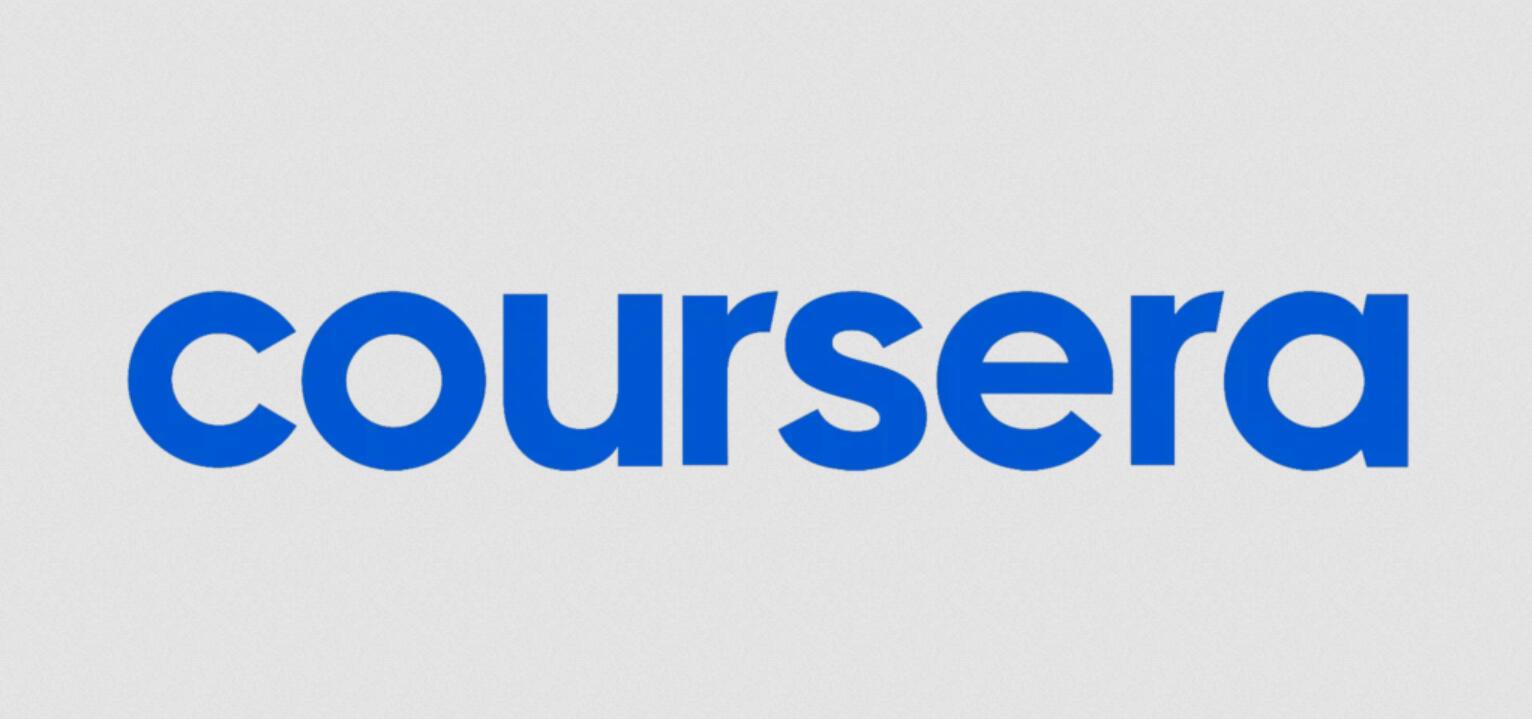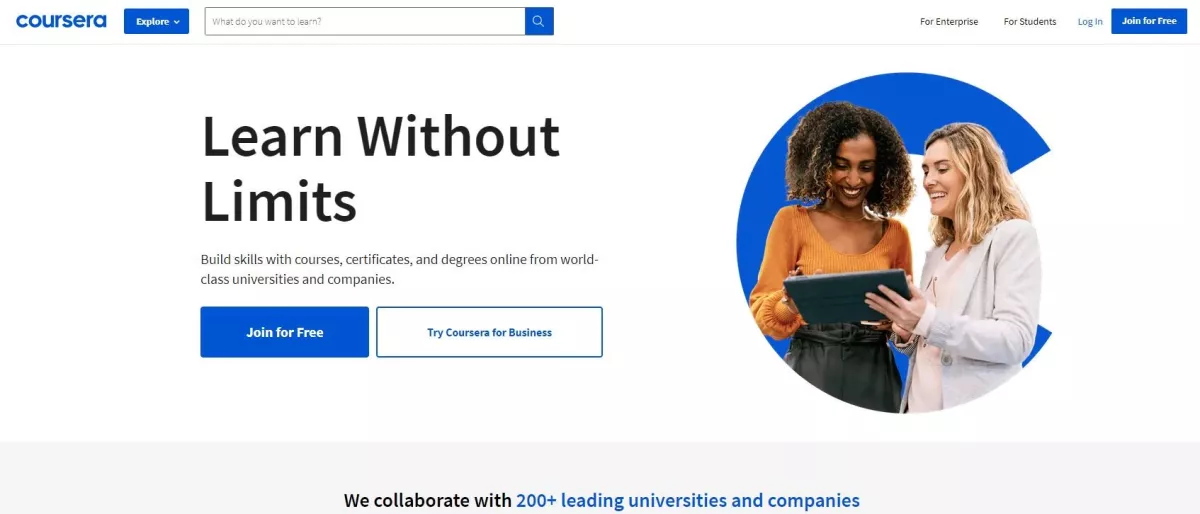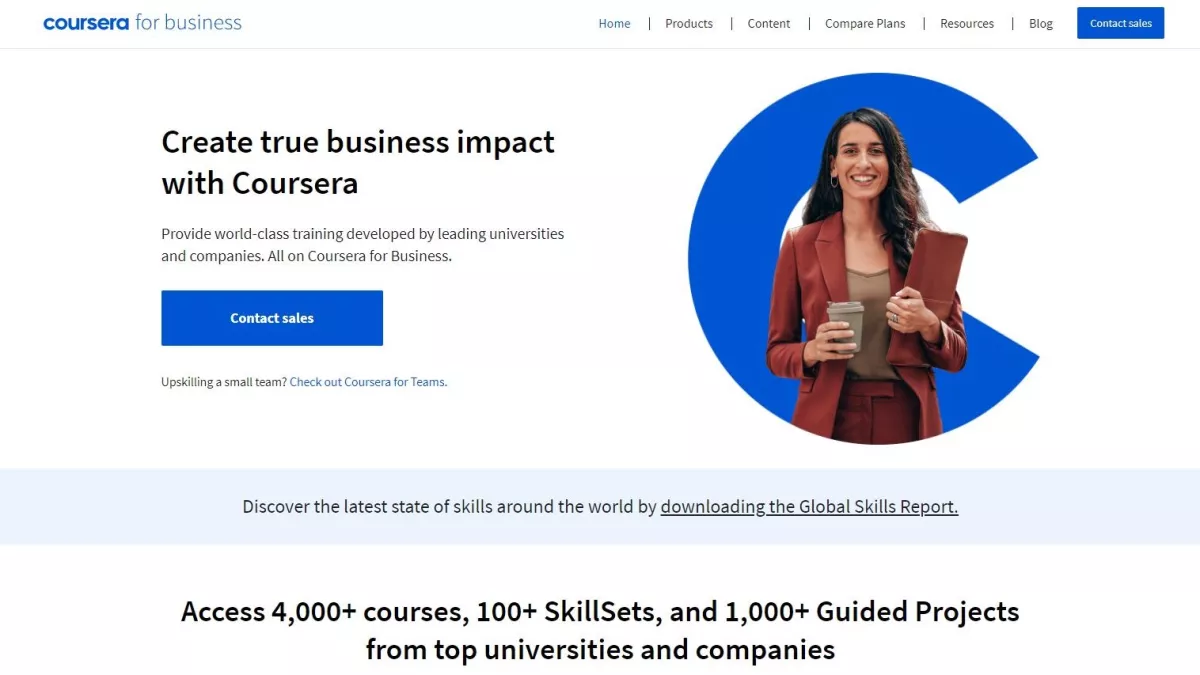FTC Disclosure:This post contains affiliate links.We’re independently supported by our readers and we may earn a commission when you buy through our links.

Coursera is an online learning platform that offers a variety of courses, specializations, and degrees in various topics—founded in 2012 by two Stanford University professors, Coursera partners with top universities and organizations worldwide to provide high-quality, accessible education to anyone with an internet connection. This article will look in-depth at Coursera’s course offerings, course quality, platform usability and design, pricing and value, accreditation and certificates, customer support, competitors, and pros and cons.
Table of Contents
Course Offerings:
Coursera offers courses, specializations, and degrees in various topics, including business, computer science, data science, health, humanities, language learning, and more. Top universities and organizations like Stanford University, Duke University, and Google offer courses. In addition to individual courses, Coursera also offers specializations, courses focused on a specific topic, and degrees offered in partnership with accredited universities.
Course Quality:
Coursera’s courses are generally high-quality, with expert instructors and engaging content. Course content is often interactive and includes videos, readings, quizzes, and assignments. However, course quality can vary depending on the instructor and the course topic. Coursera does offer user reviews and ratings to help users choose courses that are right for them.
Platform Usability and Design:
Coursera’s platform is user-friendly and easy to navigate. Course content is organized into modules, and users can easily track their progress through a course. The platform also includes features such as discussion forums, peer grading, and certificates of completion. However, some users have noted that the platform can sometimes be slow to load or buggy.
Pricing and Value:
Coursera offers both free and paid courses. Many courses are free to audit, meaning users can access course content and materials without paying. However, users must pay to access graded assignments and certificates of completion. Coursera also offers a subscription service called Coursera Plus, which provides unlimited access to over 3,000 courses and specializations for a monthly fee. While Coursera’s paid courses can be more expensive than other online learning platforms, they are often less expensive than traditional in-person courses.
Accreditation and Certificates:
Coursera offers certificates of completion for many of its courses, specializations, and degrees. These certificates can be used to demonstrate knowledge or skills to employers or educational institutions. However, it is essential to note that any educational institution or the accrediting body does not accredit Coursera’s certificates.
Customer Support:
Coursera offers customer support through various email, phone, and chat channels. The company also has a comprehensive help center with frequently asked questions and troubleshooting guides. However, some users have reported slow response times from customer support.
Competitors:
Coursera’s main competitors in the online learning space include edX, Udemy, and LinkedIn Learning. EdX is a nonprofit online learning platform founded by Harvard University and MIT. Udemy is a marketplace for online courses where anyone can create and sell courses. LinkedIn Learning is a platform that offers courses and video tutorials focused on business, technology, and creative skills.

Pros of Coursera:
- Wide range of courses and specializations: Coursera offers over 4,000 courses and specializations in various subjects, including computer science, business, engineering, and healthcare. Users can choose from a range of topics and levels of difficulty, from beginner to advanced.
- Courses from top universities and organizations: Coursera partners with over 200 universities and organizations, including Stanford, Yale, and Google, to provide high-quality course content. This ensures users can access expert instructors and up-to-date knowledge in their chosen field.
- Affordable pricing options: While some courses on Coursera are free, many require payment. However, Coursera offers a range of pricing options to suit different budgets, including single-course purchases, monthly subscriptions, and annual subscriptions.
- Reliable platform and user-friendly design: Coursera’s platform is easy to use and navigate, with a clean and intuitive design. The platform offers personalized course recommendations, progress tracking, and community forums.
- High-quality course content: Coursera’s courses are designed by expert instructors and subject matter experts, and the platform employs rigorous quality control measures to ensure that course content is accurate, up-to-date, and engaging. This ensures that users receive a high-quality learning experience.
- Certificates of completion: Coursera offers certificates of completion for many of its courses and specializations, which can be a valuable addition to a resume or educational portfolio. These certificates verify that a user has completed the course and demonstrates their commitment to learning and professional development.
Cons of Coursera:
- Limited accreditation for certificates and degrees: While Coursera’s certificates of completion can be a valuable addition to a resume or educational portfolio, they may not be recognized by employers or academic institutions as equivalent to accredited degrees or certifications.
- Limited interaction with instructors and fellow students: While some courses on Coursera offer opportunities for interaction with instructors and fellow students, many still need to. This may be a drawback for users who prefer a more interactive learning experience.
- Limited features compared to some competitors: While Coursera offers a range of features such as progress tracking and personalized course recommendations, some users may find that other online learning platforms offer more advanced features, such as real-time collaboration tools or live video conferencing.
- Coursera Plus may be more expensive than other online learning platforms: Coursera Plus is a subscription service that allows users to access unlimited courses and specializations for a monthly or annual fee. While this option may be cost-effective for users who plan to take multiple courses, some may find the subscription fee more expensive than other online learning platforms.
- Coursera vs. Other Online Learning Platforms: While Coursera is a popular choice for online learning, there are many other platforms available, such as edX, Udacity, and Skillshare. Each platform has its strengths and weaknesses, and users should compare features, pricing, and course content before choosing the platform that best suits their needs.
- Coursera for Business: Coursera also offers a range of courses and specializations explicitly designed for businesses and organizations. These courses cover leadership, data analysis, and digital marketing topics and can be a valuable resource for companies looking to upskill their employees.
- Coursera for Personal Development: Besides its professional courses and specializations, Coursera also offers a range of courses focused on personal development, such as meditation, creative writing, and nutrition. These courses can be a valuable resource for anyone looking to improve their well-being or explore new hobbies and interests.
- Coursera’s Impact on Higher Education: Coursera and other online learning platforms have disrupted traditional higher education, offering a more affordable and flexible alternative to traditional college and university programs. While some critics argue that online learning cannot replace the social and intellectual benefits of a traditional campus experience, others see online learning as an innovative and necessary evolution of higher education.
Conclusion:
Coursera is a viral and reputable online learning platform that offers various courses and specializations in various subjects. With its affordable pricing options, reliable platform, and high-quality course content, Coursera provides a valuable learning experience for users. However, users should be aware of the platform’s limitations, such as the limited accreditation of its certificates and degrees, limited interaction with instructors and fellow students, and limited features compared to some competitors. Coursera is an excellent option for anyone looking to further their education or develop new skills. Still, users should carefully consider their goals and needs before choosing an online learning platform.











